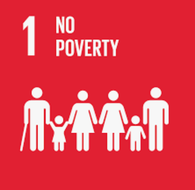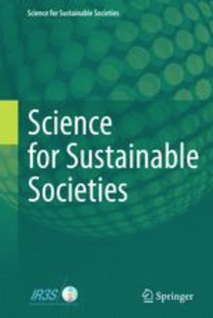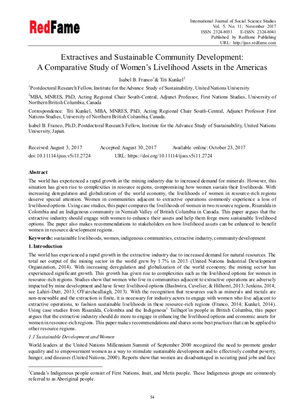Building Sustainable Communities: A Framework for Supporting Community Livelihoods and Poverty Alleviation in Resource RegionsParticipant Stakeholders: International Mining for Development Centre (now MEfDA), Continental Gold mining company, AngloGold Ashanti, Seafields Resources Canadian Exploration Company, Local and State governments of Antioquia and Risaralda, Ministry of Mines of Colombia, The University of Queensland.
Exceptional Women in Sustainability: Dr. Isabel B. Franco (Founder eWisely); Women Leaders in Antioquia and Risaralda Colombia Impact: This project proposed the use of the Sustainable Livelihood Framework (SLF) as a powerful conceptual approach for research aimed at understanding the interaction between global investment, local livelihoods and poverty reduction in resource regions. The project applied the SLF as a tool to develop recommendations for poverty alleviation, showing how it can contribute to SDG 1 No Poverty. The innovative application of the SLF helps us understand the ways in which key areas of research connect and interact as constituent components of the inherent in the framework. This project also showed that this framework helps increase our understanding of the ways communities build capacity to forge sustainable livelihoods in resource regions. It thus presents a justification for the use of the SLF, followed by an examination of the SLF principles, their implications for communities and relevance for empirical research in this field. The project also shows the way in which the SLF can be modified for application to local circumstances through case studies conducted in two resource regions of Colombia. Nevertheless, the findings of the research can be applied to other resource locations elsewhere. |
Extractives and Sustainable Community Development: A Comparative Study of Women’s Livelihood Assets in the AmericasParticipant Stakeholders: Continental Gold mining company, AngloGold Ashanti, Seafields Resources Canadian Exploration Company, Local and State governments of Antioquia and Risaralda, Ministry of Mines of Colombia, AngloAmerican Chile, The University of Queensland, University of Northern British Columbia and civil society organisations at Nemiah Valley of British Columbia in Canada.
Exceptional Women in Sustainability: Dr. Isabel B. Franco (Founder eWisely); Titi Kunkel, University of Northern British Columbia, Canada Impact: The world has experienced a rapid growth in the mining industry due to increased demand for minerals. However, this situation has given rise to complexities in resource regions, compromising how women sustain their livelihoods. With increasing deregulation and globalization of the world economy, the livelihoods of women in resource-rich regions deserve special attention. Women in communities adjacent to extractive operations commonly experience a loss of livelihood options. Using case studies, this paper compares the livelihoods of women in two resource regions, Risaralda in Colombia and an Indigenous community in Nemiah Valley of British Columbia in Canada. This paper argues that the extractive industry should engage with women to enhance their assets and help them forge more sustainable livelihood options. The paper also makes recommendations to stakeholders on how livelihood assets can be enhanced to benefit women in resource development regions. |


